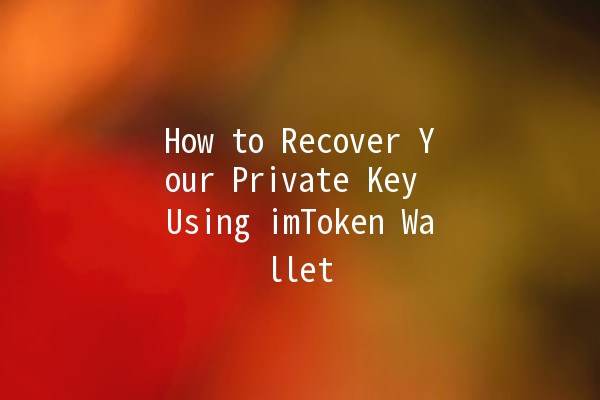Recovering a private key in imToken wallet can be a daunting task, especially for those who are not wellversed in cryptocurrency management. However, knowing how to effectively recover your private key is essential for the security of your digital assets. This article aims to provide practical advice and tips on successfully recovering your private key using the imToken Wallet.

A private key is a cryptographic code that allows you to access your cryptocurrency wallet and manage your digital assets. Think of it as the key to your safe; without it, you cannot access your valuable possessions. Private keys are crucial for signing transactions, proving ownership, and authorizing the transfer of cryptocurrencies.
Since anyone who has access to your private key can control your assets, it is vital to protect it. Losing your private key means losing access to your cryptocurrencies permanently. Thus, understanding the process of recovery becomes essential.
Backing up your private key is the first and most crucial step. Make it a habit to create a backup after any significant changes, updates, or installations.
Use secure cloud storage or encrypted USB drives to back up your private key. This ensures that even if your primary device faces an issue, you have a secure copy to fall back on.
A password manager keeps your sensitive information, including your private key, secure and readily available.
Using tools like Bitwarden or LastPass can help you store your private keys securely. Ensure that you enable twofactor authentication for an additional layer of security.
Regularly check for updates on your imToken wallet and industry news related to security.
Join relevant forums and communities on platforms like Reddit or Discord to stay updated on best practices and security threats.
Stay vigilant to avoid phishing scams that may attempt to trick you into revealing your private key.
Always verify the authenticity of websites and messages claiming to be from imToken. Avoid clicking on suspicious links and provide your private key only on verified platforms.
Familiarize yourself with different methods available for recovering your private key.
Research recovery tools and techniques, such as mnemonic phrases and hardware wallets, that can assist in reclaiming access to your cryptocurrency in case of a loss.
Recovering your private key with imToken involves understanding the wallet interface and its features. Below is a guide to assist you in completing the recovery process effectively.
Launch the imToken application from your mobile device.
Ensure you are connected to the internet and that the app is uptodate.
Locate the settings icon, usually represented as a gear symbol on the home screen.
Click on it to access your wallet's settings.
In the settings menu, look for the 'Backup' or 'Recovery' option, which typically contains information on managing your private keys.
If you have a backup phrase (also known as a seed phrase), enter it correctly. This will allow the wallet to regenerate your private key.
Make sure to input the words in the correct order, as the sequence plays a critical role in the recovery process.
To ensure your security, the app may require additional verification methods. Follow the onscreen instructions to confirm your identity.
Upon successful verification, your wallet should display your private key.
Copy this key and store it safely, preferably in a secure offline location.
If you forget your backup phrase, your chances of recovering your private key are slim. It’s crucial to secure it beforehand. However, if you have other recovery options enabled, like a multisignature setup, you might still regain access.
Yes, if someone gains access to your private key or backup phrase, they can control your assets completely. Hence, maintaining the privacy of your keys is essential.
Storing your private key in the cloud has inherent risks. Make sure to encrypt your files, use strong passwords, and enable twofactor authentication for added security.
Common signs of phishing include suspicious emails from unofficial addresses, links that do not lead to the official imToken website, and unexpected requests for your private keys.
Hardware wallets provide an extra layer of security, as they store your private keys offline. This makes it significantly harder for hackers to access your funds.
Mnemonic phrases are a series of words that act as a backup for your private key. They are usually generated during the wallet setup process and can be used for recovery if you lose access to your wallet.
Following these steps and tips can help ensure that you manage your imToken wallet effectively and recover your private key should the need arise. Always prioritize security and educate yourself on best practices for managing your cryptocurrency assets.